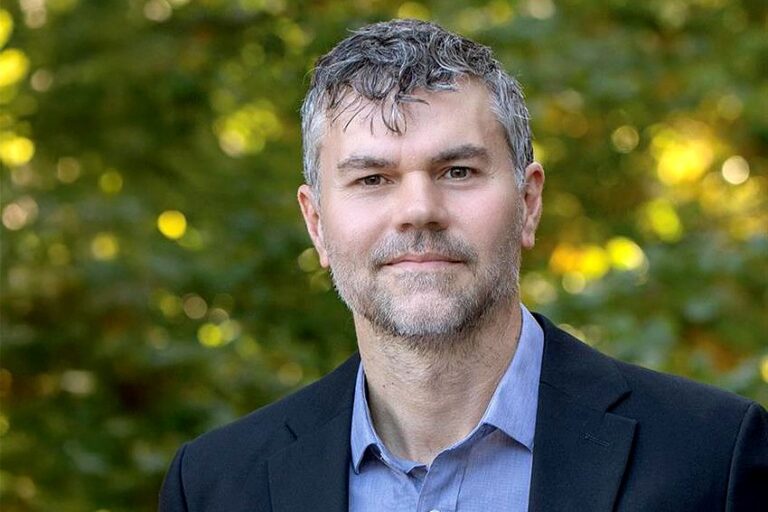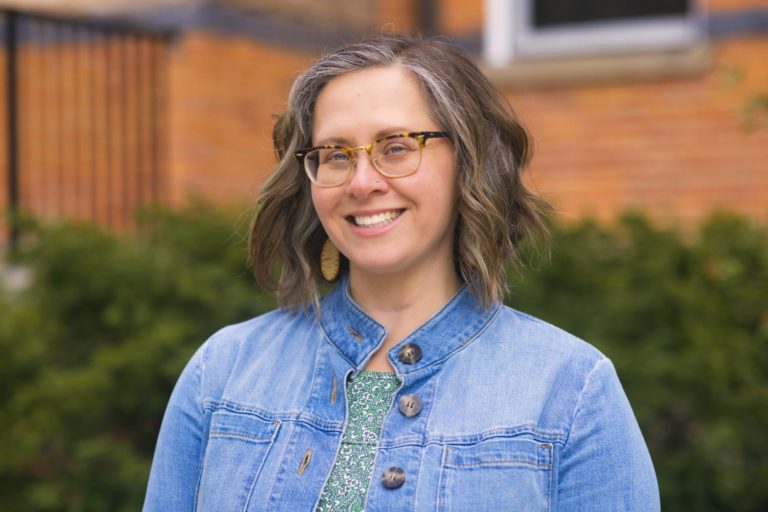As a member of the Boyer 2030 Commission, Kathleen Fitzpatrick, Director of Digital Humanities and Professor of English at Michigan State University, participated in the development of a national blueprint for undergraduate education at U.S. research universities.
This new blueprint, created to address persistent equity gaps in undergraduate educational outcomes, recently was released by the Boyer 2030 Commission in an effort to advance equity, student success, and excellence in undergraduate education at research universities in the United States. This comprehensive report, titled The Equity-Excellence Imperative: A 2030 Blueprint for Undergraduate Education at U.S. Research Universities, calls upon research universities to make equity a top priority, equally important to excellence.

The Boyer 2030 Commission report states that “excellence and equity are inextricably entwined, such that excellence without equity (privilege reproducing privilege) is not true excellence, and equity (mere access) without excellence is unfulfilled promise.”
“The equity/excellence imperative has to do with our ability to serve all of our students as well as we possibly can,” Fitzpatrick said.
The Boyer 2030 Commission, through the Association for Undergraduate Education at Research Universities (formed in 2000), is a diverse group of renowned leaders whose experience and expertise provide distinctive perspectives on undergraduate education at the nation’s 266 doctoral universities characterized by high and very high research activity (as defined by the Carnegie Classification). Members of the commission are part of research universities that serve millions of undergraduate students annually in ways distinct from liberal arts colleges, regional and comprehensive universities, community, and technical colleges.
“The equity/excellence imperative has to do with our ability to serve all of our students as well as we possibly can.”
Kathleen Fitzpatrick, Director of Digital Humanities and Professor of English
Included in the Boyer 2030 Commission report is the Charting Pathways of Intellectual Leadership initiative in the College of Arts & Letters at Michigan State University that is led by Sonja Fritzsche, Associate Dean of Academic Personnel and Administration; Bill Hart-Davidson, Associate Dean of Research and Graduate Education; and Christopher P. Long, Dean of the College of Arts & Letters and Dean of the Honors College. This initiative is designed to expand the kind of scholarship and research that aligns the process of promotion and advancement for faculty with the core institutional values of public engagement, transformative teaching, and transdisciplinary research.
An article on this initiative, written by Fritzsche, Hart-Davidson, and Long, titled Charting Pathways of Intellectual Leadership: An Initiative for Transformative Personal and Institutional Change and published in Change: The Magazine of Higher Learning in May 2022, was referenced as part of the Faculty Rewards and Structure provocation in the Boyer 2030 Commission report that explores how to recognize, support, and reward faculty across all appointment types for the expertise and dedication they bring to achieving equitable, excellent undergraduate education.
One of the strategies listed for doing this was taken from that article which recommends “undertaking careful, intentional efforts to restructure the faculty for the future, with equity and respect for the many varied contributions of faculty an essential through-line.”
The original Boyer Commission was convened by the Carnegie Foundation for the Advancement of Teaching in 1995 with the mission of making recommendations to improve undergraduate education in the United States. The commission’s report, Reinventing Undergraduate Education: A Blueprint for America’s Research Universities, came out in 1998. In order to implement the recommendations made by the 1998 report, the Association for Undergraduate Education at Research Universities (UERU) was formed in 2000.
As a follow-up to the 1998 report, in 2021, the UERU formed the Boyer 2030 Commission, consisting of a diverse group of leaders, including Fitzpatrick, whose experience and expertise provide distinctive perspectives on undergraduate education at the nation’s 266 doctoral universities.

“The world is a very different place than it was in 1998, and that is why a new Boyer Commission was needed to recommend ways to guarantee excellence and equity in undergraduate education for today’s college students,” said Barbara Snyder, President of the Association of American Universities and Co-Chair of the Boyer 2030 Commission. “Undergirding each of our recommendations is the firm belief that excellence and equity are inextricably linked for our students and our institutions, and each recommendation is informed by the significant advances we’ve made in technology and in understanding effective teaching methods since the original Boyer Commission issued its report.”
The Boyer 2030 Commission report offers recommendations for:
- increasing college access and affordability;
- leveraging digital technology;
- facilitating clearer degree pathways;
- broadening participation in high-impact educational experiences;
- adopting holistic advising;
- nurturing mental health and well-being;
- rewarding faculty for teaching excellence;
- establishing a supportive campus culture where freedom of speech is protected; and
- preparing students for success in life, work, and participation in democratic society.
Fitzpatrick, who has dedicated her career to building resilient, sustainable scholarly communities and transforming their processes of communication to foreground connection, conversation, and collaboration, is quoted in the Boyer 2030 Commission report as saying: “This is generous thinking: listening to one another, recognizing that we have as much to learn as we do to teach, finding ways to use our collective knowledge for the public good. From the broadest rethinking of our political and institutional landscape, to developing new ways of working in public, to sharing our ways of reading, to focusing on the most intimate practice of listening – at each level, we must be connected to, fully part of, the world around us.”
“Research universities are eager for solutions that advance equity and excellence. We hope today’s report will not just give them additional tools to advance this work but will also underscore the urgency of transformational change needed to better deliver on our mission.”
Peter McPherson, Co-Chair of the Boyer 2030 Commission
Another Michigan State University connection to the Boyer 2030 Commission report is that Peter McPherson, President of Michigan State University from October 1993 to December 2004, served as Co-Chair of the Boyer 2030 Commission. He also is President Emeritus of the Association of Public and Land-Grant Universities.
“The college-going population has changed dramatically since the original Boyer report was issued in 1998, reflecting critical gains in college access,” McPherson said. “But we know institutions have to adapt to better meet a diverse set of needs for these students. Fortunately, we have a growing body of evidence around data-informed approaches to improving equity and excellence in American higher education. Research universities are eager for solutions that advance equity and excellence. We hope today’s report will not just give them additional tools to advance this work but will also underscore the urgency of transformational change needed to better deliver on our mission.”
Written by Kim Popiolek


